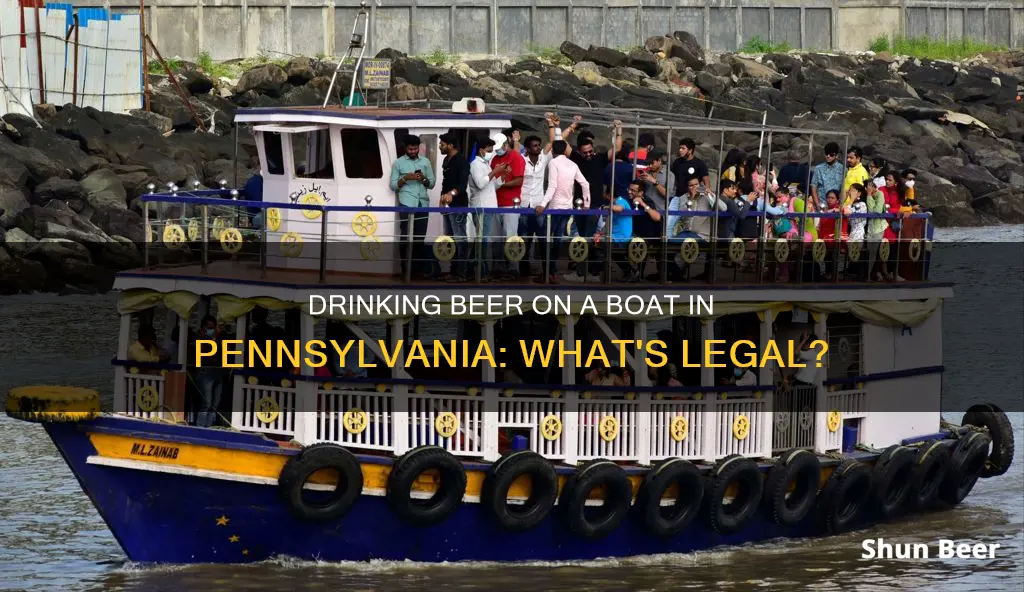
Drinking while boating is a topic that sparks a lot of debate. In the state of Pennsylvania, it is illegal to operate a watercraft after drinking enough alcohol to be rendered incapable of safely operating or being in actual physical control of the watercraft. The legal limit for an adult operating a watercraft is a blood alcohol concentration of 0.08%, the same as the limit for driving a car. For minors, the limit is 0.02%. The effects of alcohol are magnified when on a boat, and can cause reduced judgment, impaired balance, blurred vision, poor coordination, impaired judgment, and slower reaction times.
What You'll Learn

Drinking and boating laws in PA
Drinking and boating laws in Pennsylvania are strict and similar to driving under the influence (DUI) laws. Pennsylvania law prohibits anyone from boating while under the influence (BUI). This means that you cannot operate a vessel while intoxicated due to alcohol or any combination of alcohol, controlled substances, or drugs. The legal limit for an adult operating a watercraft is a blood alcohol concentration of 0.08%, and 0.02% for those under 21 years of age.
It is important to note that alcohol is prohibited on land and water at all state parks and most U.S. Army Corps of Engineers projects in Pennsylvania. This means that passengers of a boat or watercraft may not consume alcohol in these areas. The same laws apply to non-motorized boats, such as kayaks and canoes.
The penalties for drinking and boating in Pennsylvania can be severe, especially if it is not your first offence. A first-time offender caught operating a boat under the influence can face up to six months of probation, a $300 fine, and a requirement to complete an approved boating safety course. A second offence results in tougher penalties, including a minimum of five days of imprisonment and a fine of up to $2,500, plus the completion of a boating safety course. For a third offence, you could be looking at a minimum of 10 days in prison, a fine of up to $5,000, and the required completion of a boating safety course.
If you are caught operating a watercraft under the influence and refuse to take a breath or blood test, the penalties are even harsher. A first-time offender in this scenario would face a minimum of 72 hours in prison and a fine of at least $5,000, plus the completion of a boating safety course.
It is important to note that the effects of alcohol are magnified when you are on a boat, and your ability to think and perform basic tasks may become impaired. This can be extremely dangerous, not only for yourself but also for others. Therefore, it is always best to refrain from drinking alcohol if you plan to operate a boat or watercraft.
Beer and Methylprednisolone: Is It Safe to Drink?
You may want to see also

Boating under the influence (BUI) in PA
Boating under the influence (BUI) is a crime in all 50 states, including Pennsylvania. It is similar to driving a car under the influence (DUI) and is enforced by the Coast Guard. BUI laws apply to all types of boats, from canoes to cruise ships. Operating a boat requires similar skills to driving a car, such as peripheral and night vision, focus, coordination, and reaction time. When these skills are impaired by alcohol or drugs, it can cause boaters to operate their vessels erratically and unsafely.
In Pennsylvania, it is illegal to operate a vessel while intoxicated by alcohol or any combination of alcohol, controlled substances, or drugs. The legal blood alcohol concentration (BAC) limit in Pennsylvania is 0.08% for individuals 21 years of age or older and 0.02% for those under 21. Violating BUI laws in Pennsylvania can result in large fines and/or jail time, as well as the loss of boating privileges.
The U.S. Coast Guard estimates that approximately half of all boating fatalities involve alcohol. Alcohol can impair balance, blur vision, and slow reaction times, all of which can be dangerous when operating a boat. It is important to note that even if your BAC is below the legal limit, the Coast Guard can still charge you with BUI if they deem you to be impaired and unable to operate a boat safely.
If you are suspected of BUI, you may be subjected to field sobriety tests and blood or breath tests to determine your BAC. It is important to take boating under the influence charges seriously, as a conviction can have significant legal and financial consequences.
Beer and Zoloft: What You Need to Know
You may want to see also

Drinking alcohol on a boat in PA
Drinking alcohol while operating a boat is illegal in Pennsylvania. The state prohibits anyone from boating while under the influence of alcohol or any combination of alcohol, controlled substances, or drugs. The legal limit for an adult operating a watercraft is a blood alcohol concentration of 0.08%, while for minors, it is 0.02%.
Pennsylvania enforces strict penalties for those caught operating a boat under the influence of alcohol. The consequences include imprisonment, fines, and the requirement to complete an approved boating safety course. The penalties increase for subsequent offenses and are more severe if the impaired operation of a boat causes an accident resulting in injury, death, or significant damage.
It is also unlawful for passengers to consume alcohol in many areas across Pennsylvania, including state parks and most U.S. Army Corps of Engineers projects. However, some sources suggest that there is no open container law for boats in Pennsylvania, and consumption of alcohol while on a boat may be allowed as long as the operator is not under the influence.
It is important to note that the effects of alcohol are magnified when on a boat, and the combination of alcohol with stresses from wind, motion, and heat can impair judgment and the ability to perform basic tasks necessary for safe boat operation. As such, it is advisable to refrain from drinking alcohol entirely when operating a boat to ensure the safety of oneself and others.
Beer: World's Savior, Ancient Beverage
You may want to see also

PA boating safety courses
In Pennsylvania, it is illegal to operate a vessel while intoxicated. Alcohol and drugs cause impaired balance, blurred vision, poor coordination, impaired judgment, and slower reaction times, all of which can be extremely dangerous when operating a boat.
To ensure safety, Pennsylvania law requires all operators of motorboats over 25 HP and personal watercraft (PWC) to complete a boater safety course and carry a Boating Safety Education Certificate. This requirement applies to anyone born on or after January 1, 1982, and those under 21 years of age must have a blood alcohol concentration of no more than 0.02%.
The Boating Safety Education Certificate, also known as the Pennsylvania boating license, is proof that you have met the mandatory boat safety education requirements for the state. The certificate can be obtained by taking an approved online course, such as those offered by Boat-ed.com and BOATERexam.com, which are delegated providers for the Pennsylvania Fish & Boat Commission. These courses include live-action videos, comprehensive instruction, and engaging visuals to help you learn safe boating practices. The course fee is typically around $34.95, plus additional fees for the certificate and administration.
The certificate is valid for life and does not need to be renewed. However, it is important to note that there are strict laws against boating under the influence, and you can be charged if the coast guard deems you to be under the influence, even if your blood alcohol concentration is below the legal limit.
Does Helium-Infused Beer Really Work?
You may want to see also

Drinking and boating penalties in PA
Drinking and boating, also known as Boating Under the Influence (BUI), is illegal in Pennsylvania. The state prohibits anyone from boating while intoxicated due to alcohol or any combination of alcohol, controlled substances, or drugs. Alcohol is a major contributor to boating accidents and fatalities.
Pennsylvania has five BUI classifications, each with different penalties. The penalties for a BUI are similar to those for a DUI, and include mandatory jail time, a permanent criminal record, a loss of your operator's license, and thousands of dollars in fines and court costs.
Alcohol-Impairment BUI
This classification applies when a person operates a watercraft after drinking enough alcohol to be "rendered incapable of safely operating or being in actual physical control of the movement of the watercraft." The consequences for a first offense include a maximum six-month jail sentence, a minimum six-month term of probation, and a $300 fine. For a second offense, the penalties include five days to six months in jail and $300 to $2,500 in fines. A third offense carries a penalty of ten days to two years in jail and $500 to $5,000 in fines.
Per Se BUI
A per se BUI involves boating with a blood alcohol concentration (BAC) of at least .08% but less than .1%. The penalties for a first offense are similar to those for an alcohol-impairment BUI, with a maximum six-month jail sentence, a minimum six-month term of probation, and a $300 fine. A second offense carries a penalty of five days to six months in jail and $300 to $2,500 in fines. For a third offense, the penalty is ten days to two years in jail and $500 to $5,000 in fines.
High-Rate-of-Alcohol BUI
This classification applies when a person operates a watercraft with a BAC of at least .1% but less than .16%. The consequences for a first offense include a minimum of 48 hours and up to six months in jail, and a fine ranging from $500 to $5,000. A second offense carries a penalty of 30 days to six months in jail and $750 to $5,000 in fines. For a third offense, the penalty is 90 days to five years in jail and $1,500 to $10,000 in fines.
Highest-Rate-of-Alcohol BUI
A highest-rate-of-alcohol BUI involves boating with a BAC of .16% or greater. The consequences for a first offense include a minimum of 72 hours and up to six months in jail, and a fine ranging from $1,000 to $5,000. A second offense carries a penalty of a minimum of 90 days and up to five years in jail, and a fine ranging from $1,500 to $10,000. A third or subsequent offense is punishable by a minimum of one year and up to five years in jail, and a fine ranging from $2,500 to $10,000.
Drug BUI
A drug BUI involves boating with any concentration of a controlled substance in your blood or while under the influence of controlled substances or a combination of alcohol and controlled substances. This classification carries the same penalties as the highest-rate-of-alcohol BUI. For a first offense, the penalty is a minimum of 72 hours and up to six months in jail, and a fine ranging from $1,000 to $5,000. A second offense carries a penalty of 90 days to five years in jail and $1,500 to $10,000 in fines. A third or subsequent offense is punishable by a minimum of one year and up to five years in jail, and a fine ranging from $2,500 to $10,000.
It is important to note that the presence of a minor on the watercraft during a BUI can result in additional penalties, including mandatory jail time and increased fines.
Beer and TURP Surgery: What You Need to Know
You may want to see also
Frequently asked questions
No, under Pennsylvania law, it is illegal to operate a watercraft after drinking enough alcohol to be rendered “incapable of safely operating or being in actual physical control of the watercraft”. The legal limit for adults is the same as for driving a car, with a blood alcohol concentration of 0.08%.
A first-time offender can face up to six months of probation, a $300 fine, and a requirement to complete an approved boating safety course. A second offense results in tougher penalties, including at least five days of imprisonment and a fine of up to $2,500, plus a boating safety course. A third offense will prompt a prison sentence of at least 10 days, a fine of up to $5,000, and a boating safety course.
Yes, passengers are allowed to consume alcohol while on a boat in Pennsylvania. However, it is prohibited to have alcohol on land and water at all state parks and at most U.S. Army Corps of Engineers projects.
It is illegal to operate any watercraft, including kayaks, while under the influence of alcohol. However, there is no open container law for any boat or watercraft in Pennsylvania.
It is illegal to operate a boat while under the influence of alcohol. However, there are no laws prohibiting the consumption of alcohol while fishing from the shore, dock, or private property.







